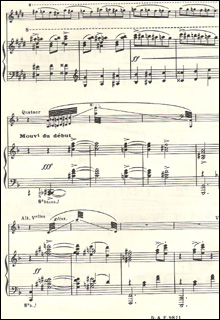
THREE HANDS: Laura Kargul's mind has
reached where her arms cannot. |
Twice this weekend pianist Laura Kargul will attempt to climb a pianist’s version of Mount Everest: Maurice Ravel’s La Valse, which Kargul has been working to perfect for close to twenty years.
Although the solo-piano version was written before the orchestral version, it is unlikely you will find as many performances or recordings of the piano transcription, which contains as much of the full score as Ravel could cram into one instrument.
Much of the original piano score contains a third staff, which might suggest the pianist would require a third hand to perform the piece. But Kargul has solved the problem of the three staves. Through intensive research and study of the orchestral score, she has worked the third staff into the rest of the piece and found a way to maintain the work’s color, which was vitally important to the Impressionist composer.
“I learned this piece on a dare while I was working on my master’s,” Kargul says. “It is the hardest thing I’ve ever played.”
Published in 1920, it is unclear whether the composer believed the full version of La Valse would ever be performed. He wrote it to be choreographed by Diaghilev, but the famous ballet choreographer turned it down because he felt the work was too complex to be successful.
Complexity is exactly what Kargul hopes to convey with her performance of the piece. After studying orchestra scores as a conductor during her graduate work, Kargul found she was able to transcend the traditional sounds of the piano and create “color,” or complexity of tone, within the 88 keys.
“To explore color on the piano you must think of other instruments,” Kargul says. At one point in her performance you might swear you heard a gong or, at times, a flute in the highest register. The piece explores the whole range of the instrument, but its success depends on the pianist reaching beyond the black and white keys and into the depths of the orchestra. This often means adjusting the phrasing, pedaling, and articulation to match the sounds of particular instruments.
Because this piece requires so much research and arrangement to play, every performer’s version will be different. Kargul’s version is generating interest far beyond Southern Maine. In November she will travel to the European Piano Teacher’s Conference in Novi Sad, Serbia, to give a lecture on her study of this piece.
“Transcriptions are not second-class citizens,” Kargul says, attacking the common perception that pianists shouldn't trifle with them, in favor of works created expressly for the piano.
“They are a rich repertoire that can be considered a sort of improvisation of the original works. And transcriptions offer an entirely different range of technical challenges,” she explains.
A virtuoso pianist himself, Ravel never performed his transcription of La Valse, but defended transcriptions in his own way, having often published piano transcriptions of his works before the orchestral versions. In a time before recorded music, transcriptions were a way for people to hear their favorite tunes without having to leave their homes.